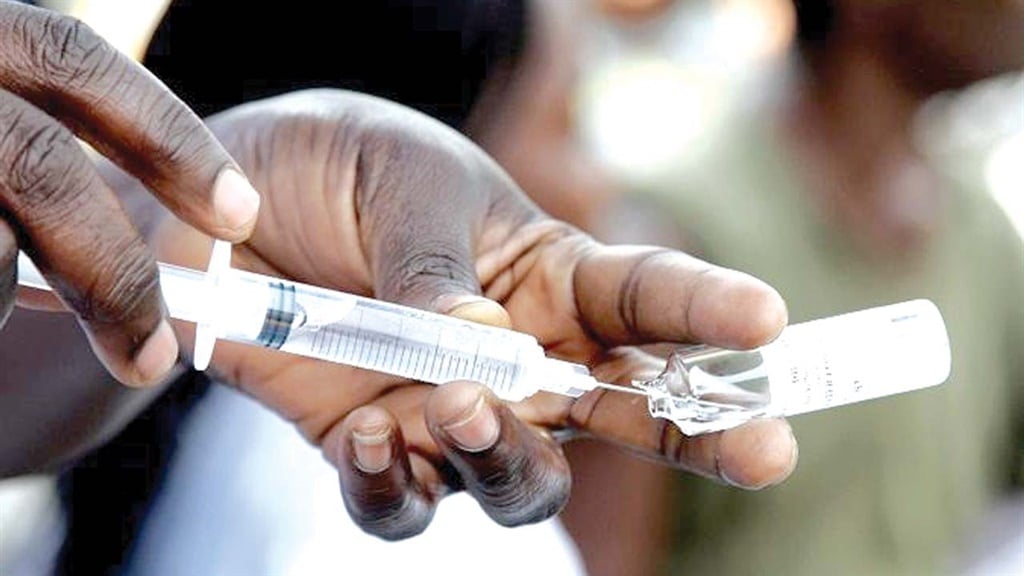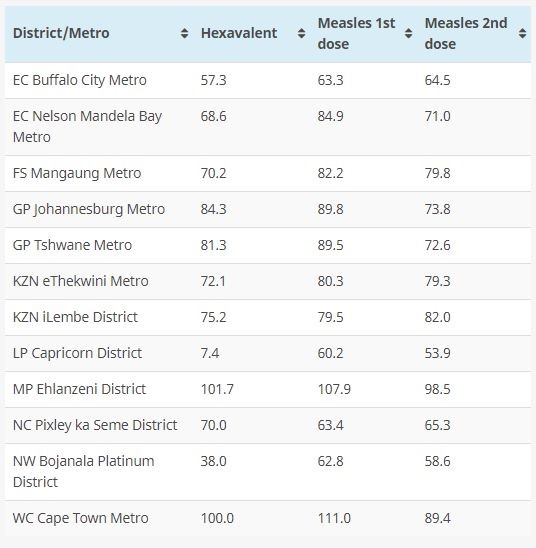
Following a decline in childhood immunisations during the Covid-19 hard lockdown last year, a nationwide child immunisation catch-up drive was launched by the national department of health in November.
The drive, aimed at children under the age of five, started with 12 districts that were identified by the department of health as being in urgent need of catching up.
The plan was for these 12 districts to catch up by the end of January after which the rest of the country would follow.
However, it appears that the drive did not meet its targets in the 12 priority districts by the end of January and not all 12 districts started on time.
READ: ‘Private & public sector should be going to vaccine manufacturers together with their money’
Spotlight has only seen data on progress in the 12 priority districts up to January. Despite various requests, we have not been able to access more recent data or data for the rest of the country.
Two districts did not participate
Out of the 12 districts, two – the City of Cape Town in the Western Cape and Capricorn in Limpopo – did not participate in the initial kick-off of the catch-up drive, according to Ntombi Mazibuko, consultant at Unicef, supporting immunisation and introducing the Covid-19 vaccine.
She says the City of Cape Town chose not to participate in the catch-up drive, while Capricorn was unable to, due to a shortage of vaccines in the province.
According to Elizabeth Maseti, deputy director of the Expanded Program on Immunisation, there is currently no national stock-out of vaccines and the shortage in Limpopo has been resolved. She adds that Capricorn has since been able to start its catch-up drive.
Western Cape department of health spokesperson Byron La Hoe confirms that the City of Cape Town was one of the 12 priority districts, but chose to conduct its own independent catch-up drive. “The Western Cape government has its own information management system – Sinjani – which feeds into the District Health Information System (DHIS) at national level,” explains La Hoe.
The 12 priority districts
Mazibuko says that the 12 districts identified were in the seven metropolitan cities (Ekurhuleni was excluded), as well as several districts in the provinces without metros.
“We were looking at the data, the number of children that each district has missed. These are the provinces that had many children who were unvaccinated or under-vaccinated,” she says.
The metros and districts are:
- Tshwane and Johannesburg in Gauteng;
- Mangaung in the Free State;
- Ethekwini and iLembe in KwaZulu-Natal;
- Cape Town in the Western Cape;
- Nelson Mandela Bay and Buffalo City in the Eastern Cape;
- Capricorn in Limpopo;
- Ehlanzeni in Mpumalanga;
- Bojanala (Platinum) in North West; and
- Pixley Ka Seme in the Northern Cape.
What the data show
The department of health provided Spotlight with vaccination coverage data for only the first three doses of the Hexavalent vaccine and the measles first and second dose in the 12 priority districts for November, December and January.
Childhood vaccination coverage (January 2021)
This does not necessarily reflect the full picture, because the focus of the catch-up drive is all vaccines for all children under the age of five, not just for children under the age of one.
According to an immunisation schedule on the national department of health’s website, Hexavalent is a combination vaccine against diphtheria, tetanus and acellular pertussis, as well as inactivated polio vaccine, haemophilus influenza type B and hepatitis B.
READ: Covid-19: Why Vaccinate – lessons from polio and many others
In the data shared with Spotlight, the target coverage for the Hexavalent vaccine is 80% at one year of age and for the measles vaccine 90%.
According to Mazibuko, the World Health Organisation and South Africa’s actual target for the measles second dose is 95% to 99%, but this is not a target the country has met – which is why districts and metros were given the interim target of 90%.
The priority districts were largely unable to meet these targets consistently across the three-month period.
Only two districts, Johannesburg and Ehlanzeni, met the Hexavalent vaccine coverage target of 80% in all three months. Four districts, Buffalo City, Nelson Mandela Bay, Capricorn and Bojanala, did not meet this target in any of the three months.
Ehlanzeni was the only district to meet the measles first dose target in all three months. Only three districts met the measles second dose target, but none of them across all three months. Ethekwini and iLembe met this target in November and Ehlanzeni in December and January.
Data from the Western Cape were included in the provided data set, but, due to the differences in how the data are captured by the Western Cape, it was not included in the above analysis.
Maseti says that performance declined in December due to the Covid-19 second wave.
“Districts are currently intensifying the catch-up of missed doses,” she says, adding that Ekurhuleni and four districts in the Free State and three in North West also started catch-up programmes in November.
The data show a trend in which coverage for the three vaccines sometimes fluctuates dramatically in specific districts over the three-month period.
Hexavalent coverage in Capricorn District in Limpopo, for example, dropped dramatically from 65.2% in November to 31.7% in December and 7.4% in January.
Mazibuko explains that the reason for such fluctuations is that not all the children who were meant to receive the Hexavalent third dose, measles one or measles two vaccine each month actually received them, which brings the coverage down. For example, a child could receive their first vaccine dose at six weeks, but then miss their second dose.
While the missed second dose may be caught up at a later stage, coverage will go down for the month the dose was missed, she explains.
In the case of the Hexavalent vaccine, the immunisation schedule outlines that the first dose is given at six weeks, the second at 10 weeks and the third at 14 weeks. If a child is meant to receive their third dose in December but misses that dose, it will bring the coverage of the Hexavalent vaccine down for that month.
She provides the example of Buffalo City in the Eastern Cape. In November, the district showed 70.6% coverage for the Hexavalent vaccine, but in December the coverage went down to 61.8%.
This means that not all the children who were supposed to receive their third dose of the Hexavalent vaccine were vaccinated in December. She adds that vaccine rates tend to decline in December because people are on holiday and might not visit their clinics at that time, but the vaccination rates usually pick up in January.
Data for children under one might not be accurate
Mazibuko says that, for children who have missed doses, if they catch up before they turn one, then their data will be filed in the DHIS. But if that child only catches up on a missed dose after they turn one then there is no file for their data to be captured on the DHIS.
She adds that this is a current gap in the system, which was noted in the catch-up drive. As a result, a new file was created to capture the data of children under the age of five.
READ: Covid-19: The cost of the cure
Yet, some districts have filed data for the children under five who were receiving catch-up doses under the file for children who are under one year old. This has inflated the data to show more than 100% coverage for children under the age of one in some districts.
In the data provided by the department of health, two districts, the City of Cape Town and Ehlanzeni, showed more than 100% coverage. The implication of this, according to Mazibuko, is that we might not be getting an accurate picture of what is happening in those districts with the immunisation of children under the age of one.
No outbreak of childhood diseases
So far, the National Institute for Communicable Diseases (NICD) has not reported any outbreaks of childhood diseases on its website, although three cases of measles were reported last year in the Eastern Cape and KwaZulu-Natal.
“These cases do not yet comprise a cluster or outbreak (defined as three cases within one health district within one month) but warrant heightened attention,” the NICD alert stated.
Balance needed between Covid-19 vaccination and childhood vaccines
“We are cognisant of the fact that the Covid-19 positive numbers have complicated everything ... and so we will compete with this pandemic when it comes to immunisation until probably everything normalises,” Mazibuko says.
She adds that the closing of early childhood development (ECD) centres in 2020 due to the pandemic, has made it difficult to reach children and caregivers to encourage them to take the child to get their immunisations.
“As I’ve indicated, without children in the ECD centres, the likelihood of reaching a target is also minimal,” she says.
Maseti also told Spotlight that the National Immunisation Coverage Survey, which was supposed to be released at the end of last year, is “awaiting approval to be disseminated to provinces”.
This article is published by Spotlight – health journalism in the public interest
| ||||||||||||||||||||||||||||||
 |




 Publications
Publications
 Partners
Partners











